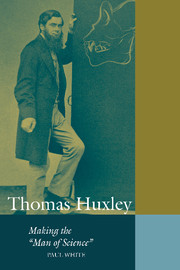Book contents
- Frontmatter
- Contents
- Illustrations
- Acknowledgments
- Introduction
- 1 Science at Home
- 2 Gentlemen of Science? Debates over Manners and Institutions
- 3 Science as Culture
- 4 The Worship of Science
- 5 “Darkest England”: Science and Labor in the 1880s and 1890s
- Conclusion: The End of the “Man of Science”
- Bibliography
- Index
- Frontmatter
- Contents
- Illustrations
- Acknowledgments
- Introduction
- 1 Science at Home
- 2 Gentlemen of Science? Debates over Manners and Institutions
- 3 Science as Culture
- 4 The Worship of Science
- 5 “Darkest England”: Science and Labor in the 1880s and 1890s
- Conclusion: The End of the “Man of Science”
- Bibliography
- Index
Summary
Perhaps the very silliest cant of the day, is the cant about culture.
– Frederick Harrison, 1867By presenting Owen as a person corrupted by power and self-interest, and by portraying the reclusive Darwin as the epitome of the pure and detached researcher, Huxley helped to shape the identity of the scientific practitioner as autonomous from society. But Huxley and the new generation of researchers he helped to train were in fact much more like Owen, employed in government institutions or on state-sponsored projects, embedded in institutional politics, implementing imperial policies. Perhaps even more than Owen, Huxley embraced the public role of science and sought to advance it. In addition to his duties at the School of Mines and Geological Survey, his teacher-training courses, and his public lectures, Huxley worked as a Science and Art Department examiner and as an inspector of fisheries; he eventually served on seven royal commissions, reporting to the state on matters of education reform, the fishing industry, and vivisection. In these posts, he employed his particular expertise in marine zoology and as a teacher of science. But he also developed for the man of science a broader agenda as cultural critic and commentator, competent to intervene in matters of general public interest or concern. Secured by scientific methods and procedures – acquired and honed in the laboratory – against any corrupting social interests or influences, the man of science, Huxley claimed, was the best of public servants.
- Type
- Chapter
- Information
- Thomas HuxleyMaking the 'Man of Science', pp. 67 - 99Publisher: Cambridge University PressPrint publication year: 2002
- 3
- Cited by

